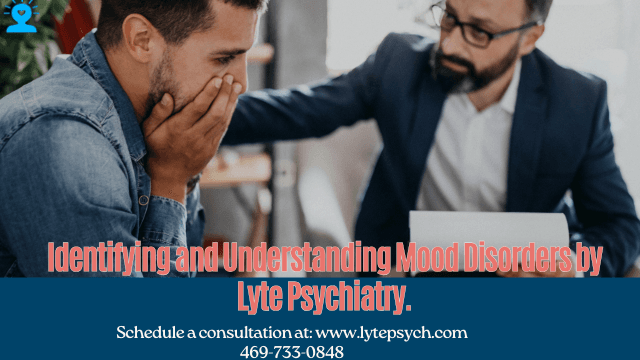Tue Jun 18 2024
Identifying and Understanding Mood Disorders: Expert Insights from Lyte Psychiatry, Best Psychiatrist and Therapist Near You (Affordable Adults and Adolescents Therapist and Psychiatrist Near You) Dallas, Fort Worth, TX

Identifying and Understanding Mood Disorders: Expert Insights from Lyte Psychiatry, Best Psychiatrist and Therapist Near You (Affordable Adults and Adolescents Therapist and Psychiatrist Near You)
Understanding Mood Disorders
Definition of Mood Disorders
Types of Mood Disorders
Mood disorders include a range of conditions, such as:
Major Depressive Disorder (MDD): Characterized by prolonged periods of deep sadness and loss of interest in activities.
Bipolar Disorder: Involves extreme mood swings, from manic highs to depressive lows.
Cyclothymia: A milder form of bipolar disorder with less severe mood changes.
Causes and Risk Factors of Mood Disorder
Mood disorders arise from a mix of genetic, biological, environmental, and psychological factors:
Genetics: Family history increases the risk.
Biological Factors: Chemical imbalances in the brain.
Environmental Triggers: Stressful life events or trauma.
Psychological Factors: Personality traits and coping mechanisms.
Symptoms of Mood Disorders
Emotional Symptoms Common emotional symptoms include:
Persistent sadness or hopelessness
Excessive irritability or anger
Anxiety and restlessness
Feelings of worthlessness or guilt
Physical Symptoms Physical symptoms often manifest as:
Changes in appetite or weight
Sleep disturbances, such as insomnia or oversleeping
Fatigue and low energy levels
Physical pains and aches without a clear cause
Behavioral Symptoms Behavioral changes might include:
Withdrawal from social activities
Difficulty concentrating or making decisions
Loss of interest in activities once enjoyed
Suicidal thoughts or behaviors
Diagnosing Mood Disorders
Diagnostic Criteria: Diagnosis is based on established criteria, such as those in the DSM-5 (Diagnostic and Statistical Manual of Mental Disorders), which outline specific symptoms and their duration.
Role of Mental Health Professionals: Psychiatrists, psychologists, and licensed therapists assess mood disorders through comprehensive evaluations, including patient interviews and standardized questionnaires.
Diagnostic Tools and Tests Diagnostic tools include:
Psychological Evaluations: In-depth assessments by mental health professionals.
Medical Tests: Blood tests and physical exams to rule out other causes.
Neuroimaging: Occasionally used to identify brain abnormalities.
Treatment Options for Mood Disorders
Psychotherapy Psychotherapy, or talk therapy, helps patients understand and manage their mood disorders. It involves working with a therapist to explore thoughts, feelings, and behaviors.
Lifestyle Changes Implementing healthy lifestyle changes is crucial. Key areas to focus on include diet, exercise, and sleep hygiene.
Psychotherapy for Mood Disorders
Cognitive Behavioral Therapy (CBT) CBT is effective for many mood disorders. It helps patients identify and change negative thought patterns and behaviors.
Interpersonal Therapy (IPT) IPT focuses on improving communication skills and addressing interpersonal issues that may contribute to mood disorders.
Other Therapeutic Approaches Other approaches include:
Dialectical Behavior Therapy (DBT): Focuses on emotional regulation.
Psychodynamic Therapy: Explores unconscious processes influencing behavior.
Group Therapy: Offers support through shared experiences.
Medication for Mood Disorders
Mood Stabilizers Medications like lithium and valproate help manage mood swings, particularly in bipolar disorder.
Antipsychotics Used to treat severe mood disorders, especially when psychotic symptoms are present.
Lifestyle Changes for Managing Mood Disorders
Diet and Nutrition A balanced diet rich in essential nutrients supports overall brain health and mood regulation.
Exercise Regular physical activity boosts mood by releasing endorphins, which act as natural mood lifters.
Sleep Hygiene Maintaining a regular sleep schedule and creating a restful environment are vital for mental health.
Coping Strategies for Mood Disorders
Stress Management Techniques Techniques such as deep breathing, meditation, and yoga can help manage stress and reduce anxiety.
Building a Support System A robust support network of family, friends, and support groups is essential for emotional well-being.
Mindfulness and Relaxation Techniques Practicing mindfulness and relaxation can improve emotional regulation and reduce symptoms of depression and anxiety.
Living with Mood Disorders
Daily Challenges and Coping Mechanisms Individuals with mood disorders face daily challenges that require effective coping mechanisms, such as maintaining routines and seeking support when necessary.
Long-term Management Strategies Long-term management includes continuous treatment adherence, regular therapy, and lifestyle adjustments to prevent relapse.
Success Stories and Positive Outcomes Many people successfully manage mood disorders and lead fulfilling lives. Sharing these success stories can inspire and provide hope to others.
Children and Mood Disorders
Recognizing Symptoms in Children Mood disorders in children can manifest differently, with symptoms such as irritability, academic decline, and social withdrawal.
Treatment Approaches for Young Patients Treatment for children often involves a combination of therapy, family involvement, and sometimes medication.
Parental Support and Education Educating parents about mood disorders and effective support strategies is crucial for treatment success.
Seeking Professional Help & Diagnosis with Lyte Psychiatry
Mood disorders are complex conditions that require a comprehensive approach to treatment and management. Understanding the symptoms, seeking professional help, and making lifestyle changes can significantly improve the quality of life for those affected.
To Schedule an appointment. Click Here
To see our services. Click Here
Call us if you have questions at 469-733-0848
FAQs
Q: What are the common symptoms of mood disorders?
A: Common symptoms include persistent sadness, changes in appetite and sleep patterns, fatigue, irritability, and loss of interest in activities once enjoyed.
Q: How are mood disorders diagnosed?
A: Diagnosis involves a comprehensive evaluation by a mental health professional, including patient interviews, psychological assessments, and sometimes medical tests to rule out other conditions.
Q: Can lifestyle changes help manage mood disorders?
A: Yes, lifestyle changes such as maintaining a healthy diet, regular exercise, and good sleep hygiene can significantly improve mood and overall mental health.
Q: How can family and friends support someone with a mood disorder?
A: Family and friends can provide emotional support, encourage treatment adherence, and use effective communication strategies to support a loved one with a mood disorder.
Q: What advancements are being made in the treatment of mood disorders?
A: Advancements include new therapies like transcranial magnetic stimulation (TMS) and ketamine infusions, as well as technological innovations like mental health apps and online therapy platforms.